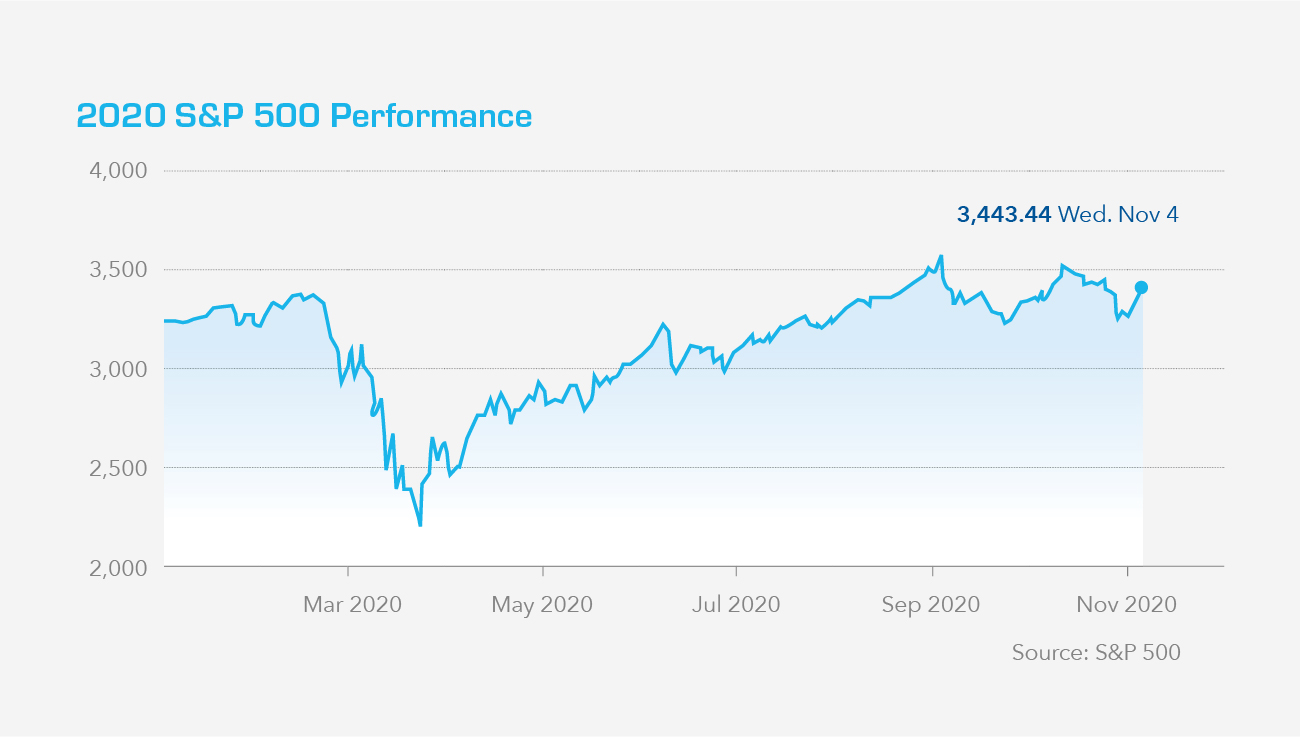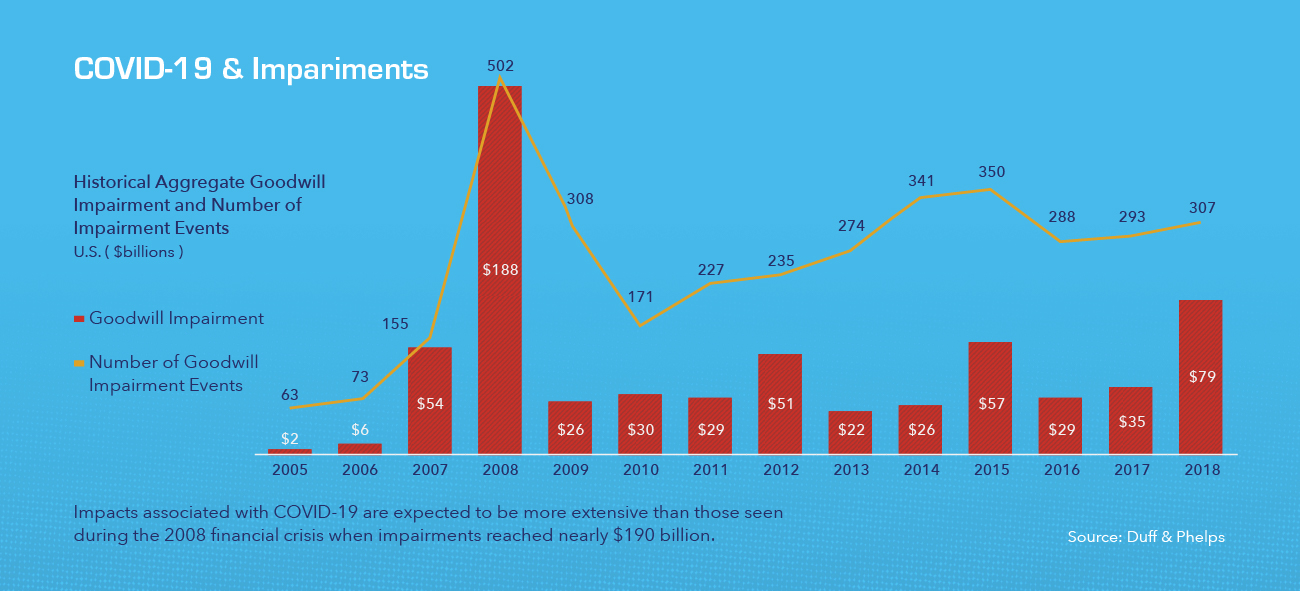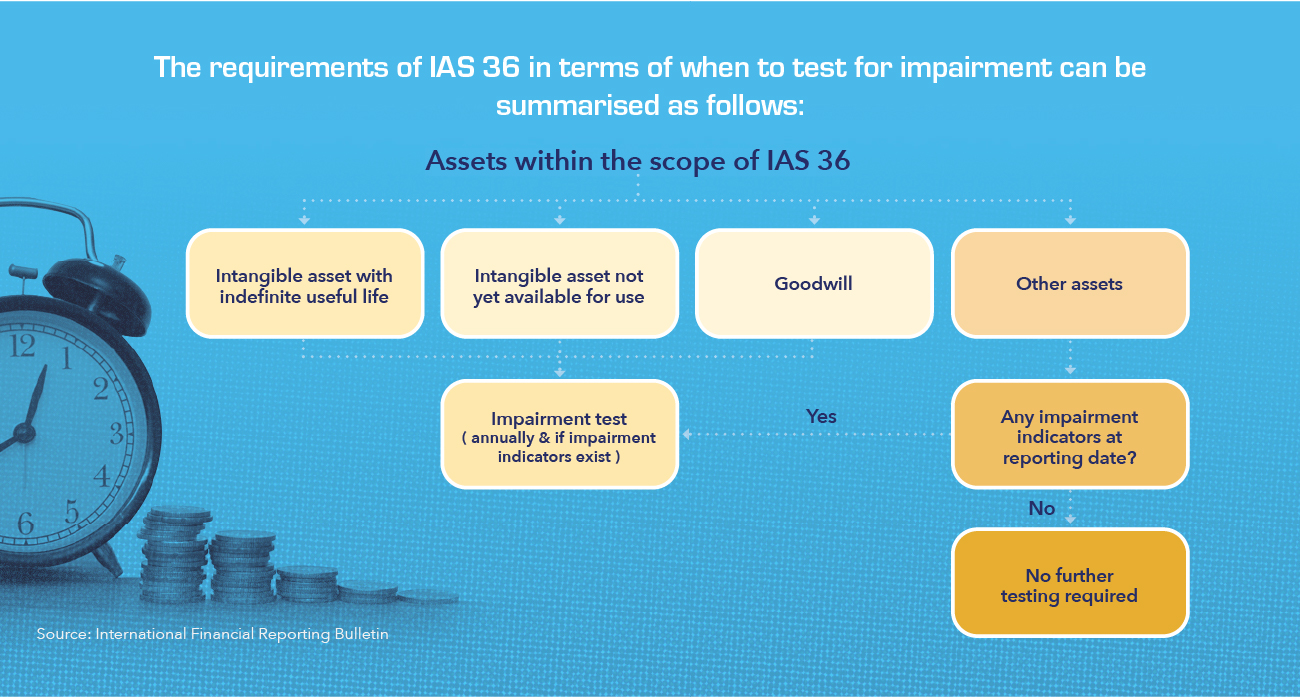Best Practices in Impairment Testing, Enterprise Valuation and Portfolio Review in the Wake of COVID-19

In this article we take a look at the importance of a continued commitment to determining impairments, despite the rebound in both equity and debt markets, as well as recommended best practices in both enterprise valuation and portfolio review during the ongoing pandemic.
The unprecedented pandemic-driven selloff in March of 2020 placed equities in historically uncharted waters. Even though COVID-19 arrived in the U.S. during the last half of the quarter, its sudden and profound impact on cash flows and revenue caused a great many U.S. investment managers and companies concern as well as confusion in regard to how to best approach their Q1 marks. As one might expect, during this period and well into Q2, there was a notable and heightened focus by companies placed on reviewing the then-current state of impairments as part of the broader valuation process.
Fast forward to Q4 2020 where, although the pandemic and its many implications continue to linger, there is widespread relief that debt and equity markets have largely recovered on both price and spread, and current valuations, as compared with those delivered at the end of Q1/start of Q2, have remained significantly elevated. This is in large part a result of the Fed’s ongoing strategy and continued belief in a return of consumer and investor confidence spurred by stimulus and massive liquidity already provided as well as that likely to come. With the second wave of COVID-19 cases now upon us in the U.S., however, there exists the possibility of a correlated economic stall based on less available consumer discretionary income and decreasing corporate liquidity. It should also be noted, that for the vast majority of companies, 2020 earnings are at the present time in no way reflective of their normal profile. While earnings remain lower, multiples are in many cases abnormally high and a careful evaluation of 2020 cash flows and 2021 projections, when conducted on companies across numerous industries, is likely to lower valuations in many cases.


Impairment Testing and Enterprise Valuation
Despite the recovery in equity markets, based on our vast experience both during and following previous downturns, Hilco believes continued diligence pertaining to determining potential impairments is highly advisable. Given the current environment, it is perhaps more important than ever to keep in mind that measurement of impairment comes down to the prospects of a given business and how companies think about themselves and are perceived at a given point in time. So, while the S&P500 has essentially now made a full round trip, it is possible that there are numerous businesses that may well still have an impairment. That impairment could either be 1) market-shift driven, where the multiples paid for businesses of that type have now dropped because they are out of favor or 2) intrinsic to the business itself, where an erosion in profitability or inability to generate revenue is now impairing or may likely impair asset value in the future. Relevant examples here range from retail businesses which had not sufficiently developed their ecommerce/omnichannel platform prior to the pandemic, to the entertainment industry and theater chains where the future of audience attendance is in great question not only because of the physical environment but also because of the proliferation of streaming and online movie releases during this period, resulting in a potential long-term shift in behavior. So, even though the markets have recovered, the need for a thorough determination of whether or not the business interruption or disruption in question – in this case the ongoing pandemic and its many consequences – is a long-term concern or merely an anomaly for the subject business, is still quite essential.
Valuation specialists possess the specific expertise to accurately distinguish between a temporary shock to a company’s cash flows and true impairment and can articulate a strategy for determining and documenting the difference. Was a company struggling prior to COVID-19? If so, then there may well be a true impairment. If not, a careful analysis should be conducted to assess numerous factors including the business’ tangible and intangible assets, and its performance potential beyond the term of the incident causing the shock; in this case, the pandemic. At present, certain industries including travel, leisure and retail can clearly be classified as susceptible to this type of temporary shock from the fallout of COVID-19. But, for example, if a cruise line does not have the liquidity to quite literally stay afloat while its ships are mandated to remain in dock, then perhaps there are underpinning, pre-existing factors such high capital and maintenance costs associated with an aging fleet that created distress even prior to the pandemic’s impacts. If, however, a realistic assessment can be made that the pandemic is an event with defined start- and end-term impacts for the subject company, and it will return to business as usual following that period, then essentially the only thing that would change in terms of marking its book would be the discount rate.
Another wrinkle here is consideration of whether there had been a step-up in the value of any of the assets on the books, based at least in part on prior acquisitions or the step-up in market value. With the lingering effects of the pandemic still weighing on business without a clear endpoint, we view it as critically important to embrace the mindset of a regular, ongoing commitment to assessing whether the business is still worth the stepped-up amount which is reflected in goodwill. If it is, a normal amortization process can then be followed. If it is not – because, for example the company is facing distinct challenges from the pandemic that will result in it being less profitable in the future – then the company should be prepared to take that impairment, whether to goodwill or the appropriate assets that may no longer be as valuable.
Additionally, with respect to an income approach to valuation we advise now, as always, a detailed review the projections, free cash flows and other inputs of that nature provided directly by the company. These help to inform our determination as valuation specialists, as to whether an impairment does indeed exist. Here, reinforcing the point made earlier, there is a need to apply a significant degree of valuation expertise and judgment regarding factors such as the level of discounts that should come into play based on lack of marketability, or whether there are specific costs of equity that need to be applied to a private vs. public company. Case in point- in a climate such as this, we do not tend to value 2020 results as significantly as we might otherwise and certainly not as heavily as a reliable set of metrics from 2019. In addition, valuation specialists should adjust discount rates – weighted average cost of capital (WACC) – in order to reflect the uncertainty of projections in this climate.
Along with discounted cash flows, at Hilco, our Valuation team is careful to fully explore terminal value assumptions on behalf of clients. Under normal conditions we might typically expect the terminal value to experience little change, as it is based on the end of a measurement period some five years out. So even when factoring in the impacts of COVID-19, the temptation might be to assume that one “hiccup” year would have only a minimal impact across the entire pre- to post-COVID five year continuum. But what about the airlines and hotel and restaurant chains for example? Here, as referenced earlier in regard to impairments, it is important to recognize when the nature of these and other businesses may make them particularly susceptible to more long-term challenges presented to the market by an event such as the pandemic. Conversely, for other industries, if five years out, you’re able to project the same amount of earnings as you would have pre-COVID, then the value of your equity – assuming no change to the cost of capital – would not materially change. We view this as a hot button issue for investors because they will want to make sure you’re not inflating or in some cases overly deflating your value from the standpoint of your quarterly and year-end marks. Yet another reason engaging valuation specialists is critical.
Lastly, here, we believe it is important to point out that during this period we view the use of prior transactions in employing a market approach to valuation as likely to prove difficult due to the significant variance in market conditions that now exists. Identifying appropriate comparable transactions from 2018 or 2019 for application to theoretical transactions that might be done in the current environment is a very tall order right now, particularly given the notable “bottom fishing” that is taking place in the market at this moment. As we have discussed, the traditional transaction approach utilizes LTM metrics, which are certainly skewed due to the effect of the shutdown on many industries. Accordingly, we believe it makes sense to place somewhat less emphasis here.
There will undoubtably be a multitude of techniques that are ultimately applied to these practices given the uniqueness of COVID-19 and the unique nature of its varying impact across so many sectors and industries. While there is not much specific guidance coming from the accounting boards or the SEC on these practices right now, audits and regulatory reviews will closely scrutinize the assumptions that a company has made and the documentation behind them, to make a determination as to whether or not those are reasonable. For these and other reasons articulated here, the expertise of a highly experienced valuation specialist is, again, highly advised.

While much is unknown about when the ongoing impacts of COVID-19 will cease to be such an intrusive and disruptive force across so many industries and sectors, we believe it is fair to say that overall, private assets today are likely worth less on average than they were before the pandemic simply because there is now more emphasis on liquidity and transparency in the marketplace. Additionally, based on existing conditions, we view it as advisable to lessen reliance on current earnings, instead normalizing price to 2019 EBITDA measures and utilizing 2021 earnings forecasts where they have been updated. This thought process is premised on the thinking that both last twelve months (LTM) and 2020 transaction multiples are likely to provide limited and potentially misleading insight in the ongoing pandemic environment. With earnings metrics low and the market relatively unchanged given the rally over the past several months – albeit with some segments meaningfully lower, it is likely that these multiples will stand out as noticeably high. From our perspective, this is the type of thinking, and these are the types of comparisons that are needed now in terms of market testing.
Conclusions
Management teams that have seen performance falter in 2020 are well advised to have their assets tested for impairments. Additionally, it is critical to note that while some impairments are a matter of materiality or are somewhat more obvious, the expertise of third-party valuation specialists is of significant value in documenting and articulating these determinations as well as in making critical judgements on those more complex in nature. Management’s input is, of course, also essential as a part of this process.
In regard to portfolio review during the ongoing crisis, as noted earlier, 2020 earnings are not going to be a meaningful measure. Additionally, these efforts should be approached with a somewhat greater level of scrutiny and consideration as to the specifics of not only how businesses have changed as a result of recent events but also, how the market has changed its perception of those businesses, their respective industries, and the markets in which they operate as well.
Our team is actively involved in numerous impairment testing and quarterly portfolio review engagements during the current crisis. This work and the ongoing dialogue we are maintaining with our many partners and contacts in both the financial markets and across a multitude of industries during this period, continue to provide us with a wealth of highly relevant information and insights. Whether you manage the financial reporting function within a business or you manage a portfolio of businesses, we welcome the opportunity to share this knowledge and our perspective with you. Please feel free to reach out to our team. We are here to help during this complicated time.
Hilco’s Enterprise Valuation Services
Hilco is a global leader in providing reliable opinions for financial institutions, investment firms and corporations on the realizable value of going concerns, intangible assets, illiquid investments,
and other specialized business assets. The Enterprise Valuation group is part of Hilco Valuation Services, which specializes in appraising and assessing the market value of inventory, machinery and equipment, intellectual property, and full enterprises at the manufacturing, wholesale/distribution and retail levels. Hilco Valuation Services also provides ASC 805, 350, and 820 valuations, and valuation dispute services. Hilco Valuation Services customers may be lenders, private equity, hedge funds, lawyers, investment banks, governments, and general corporate entities that must establish the market value of business assets as collateral for financings, merger and acquisition transactions, or for accounting, reporting, compliance, and tax matters. Hilco Valuation Services employs more than 150 professionals and serves the global marketplace from offices in key business centers throughout the United States, Brazil, Canada, Mexico, and the United Kingdom.




